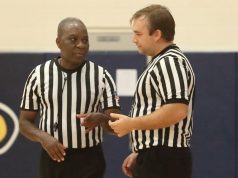Many Referee readers officiate more than one level of a sport or, at least, hope to do so. That could be middle school and high school, high school and college or even college with a spot of pro. Regardless of the pairing, from my own experience, one thing is undeniably true: The arrangement can be a jealous one, like having two love interests — and to make matters worse, they know all about each other.
While a common-sense approach to growth as an official is to build on the bedrock of a previously established level while inserting yourself into the next, there’s a risk to that approach. That risk is usually born of too much enthusiasm or even greed. Every place you go to work expects your best from you and, if you aren’t careful, you can put yourself in an avoidable bind. Let’s look at all the fun ways of going wrong caused by having two bosses and how to avoid them — because once you’ve actually caused problems, they can be very difficult to live down.
Priorities
When I worked high school and college football, I had the former on Thursdays and Fridays, with the latter on Saturday. That’s three days in a row when you stand to interrupt someone else’s life or process, unless you’re one of those lucky ones who lives under a bridge and is accountable to no one. Working many days of a week, especially consecutive ones, can cause more strain on your relationships than you may notice; that includes relationships with your spouse, kids, boss, assigners, etc. Do as much as you can to keep your life balanced. For every official who washed out on the field or court while trying to climb the ladder, there’s another who lost a loved one, career or place of residence through his or her inability to say no.
Conditioning
The way things tend to go, your highest-level game during a week is the final one; it’s the one you might work after triple overtime one night, followed by a monsoon and riot the next. If you’re a college official, for example, someone probably values your fitness ethic as one of the reasons to risk using you on their schedule. If you’re worn out or worn down by the time you reach the game where the most is demanded of you, you’re in for a short career on the big stage. Bluntly stated, unless you are so certain of your fitness and demeanor that no one can tell when you worked your previous game, it’s time to consider whether your schedule is too heavy and doing anyone any good. That notion leads to …
Attitude toward your assignments
I see some officials try to pace themselves through the week’s activities so that they have enough left for the “big” game; they forget that all their games are “big” to someone. Few things are more annoying to fans, coaches, players, fellow officials and assigners alike than watching someone schlumping through a high school clash the day before a college game. They look like they’re preserving energy or acting like they’re somehow above their surroundings. If you don’t give a lower-level game your best effort — whatever the reason — people can tell, and your reputation will be tarnished and your progression slowed, if not worse.
Logistics
There are two problems. I worked with a guy on a high school football crew who also worked college ball. Believe me, he seldom went places on Friday night and Saturday that were close enough to home to get him a clean uniform and a good night’s sleep in between. Unless you’ve somehow managed to coordinate your schedule with both assigners, you stand to become a skunk in everyone’s pup tent. Working Friday night varsity games is very much a cultural activity on many crews; so, if you’re on a tight schedule, sitting in the car, leaning on the horn while your crewmates chug the beverage of their choice inside, you will soon be no fun at all. Similarly, if you show up at your Saturday pregame meeting looking like you’ve had three hours sleep and then doze off on a crewmate’s shoulder, no fun at all will be about the best you can hope for. Whatever your ambitions in officiating, make sure you don’t set yourself up for ducking games at the last minute or sleeping through alarms because you chose “any” itinerary over one that made practical sense. Accept the reality of your situation and plan accordingly.
While on the subject, don’t go cheap on uniforms. If you work across state lines in basketball at different levels, for example, you might need more than half a dozen uniform combinations. Whatever the case, if you work a lot, it’s prudent to have two (or more) kit bags on the go. Always plan for one of them to burst into flames at the worst possible moment. If you insist, however, on trying to make it through a schedule on one uniform change, be careful. Showing up to a game in a ratty uniform that you didn’t have time to wash is like showing up with a dirty soul. You’ll be a bum before the game begins.
If you want to work a lot of jurisdictions, plan on owning a lot of equipment. And even if you’re fortunate enough to have someone else wash your uniform and not tie it in knots as they lovingly pack it, always have your own routine for packing. Never let someone else pack your parachute and never let someone else pack your uniform. They don’t have to work without compression shorts; you do.
Rules
Although the news has yet to reach most high school coaches and fans, the rules are different at different levels. That means if you work multiple levels, you run the risk of applying the right rule on the wrong day of the week. When I worked football in Ontario, we would occasionally have CFL officials come and work our junior football league games with us on Saturday. The stipulation from the CFL was that the official could not white hat the lower-level game; they didn’t want him risking crossing his wires memorizing the amateur rules and misapplying the corresponding rule in front of the pros. Point well taken. I’ve written before that successful officiating includes a measure of seeing and reacting to plays that is more like a conditioned response — a reflex, if you will — than a cognitive decision. So, unless you put an exponential amount of effort into attenuating those responses to each level you work, you can easily cause problems for yourself and others. Working multiple levels requires a commitment to rules knowledge that is greater than the sum of its parts.
Progressing in officiating is a two-edged sword
The same elixir that produces success by effort becomes the poison you drink if you can’t manage your career in moderation. If you’ve got talent and good support, the right people will find, mentor and advance you. If you push so hard that you fall victim to some of the problems written here, it will inevitably hold you back.
Whenever you work a game, do it for the benefit of the one at hand, not the one you hope to get.
Tim Sloan, Davenport, Iowa, is a high school football, basketball and volleyball official, and former college football and soccer official.
What's Your Call? Leave a Comment:
Note: This article is archival in nature. Rules, interpretations, mechanics, philosophies and other information may or may not be correct for the current year.
This article is the copyright of ©Referee Enterprises, Inc., and may not be republished in whole or in part online, in print or in any capacity without expressed written permission from Referee. The article is made available for educational use by individuals.
















